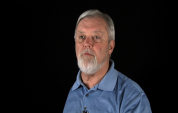7:34 | Tommy Clack was the first officer in eight generations of enlisted men. Advice from his dad to always listen to his NCOs served him well in the chaos of Vietnam, where the book went out the window.
Keywords : Tommy Clack artillery 105 mm shell 155 mm shell Time on Target Vietnam rotation NCO friendly fire phosphor marking round Rules of Engagement

Military duty was a family tradition for Tommy Clack. While many of his generation were going to great lengths to stay out of the war, he withdrew from college and volunteered for the Arm, where he went through OCS and became an artillery forward observer.
The first thing that Tommy Clack learned after arriving in Vietnam was that his training was outdated and irrelevant to the conditions on the battlefield. Still, he adapted and overcame as he worked to train others on new munitions.
After his first Vietnam tour, artillery officer Tommy Clack tried to modify stateside training to better prepare soldiers for actual conditions. Returning for a second tour, he insisted on forward duty with a combat unit.
Tommy Clack gained a healthy respect for the North Vietnamese Army, who were well armed and used brilliant tactics, including the use of available resources to fashion booby traps.
Tommy Clack was taught by John Racine, one of his NCO's, how to find out who was shooting in a firefight and who was just staying out of it. After the battle, you felt the gun barrels of the soldiers on the line.
In a letter home, Tommy Clack expressed his worry that something bad was going to happen and it did when his unit engaged the NVA near the Cambodian border. He saw the enemy soldier stand and fire the RPG that changed his life forever.
Tommy Clack was out for seven days following his gruesome injury at the Vietnam front. He gradually became aware of missing limbs and a pretty nurse. His memories of an out-of-body experience after he was hit became the subject of a television documentary.
When Tommy Clack met Max Cleland, another triple amputee, and saw him get into a car and drive off, he knew he could eventually do it, too. Soon he was taking other veteran amputees on hunting and fishing trips.